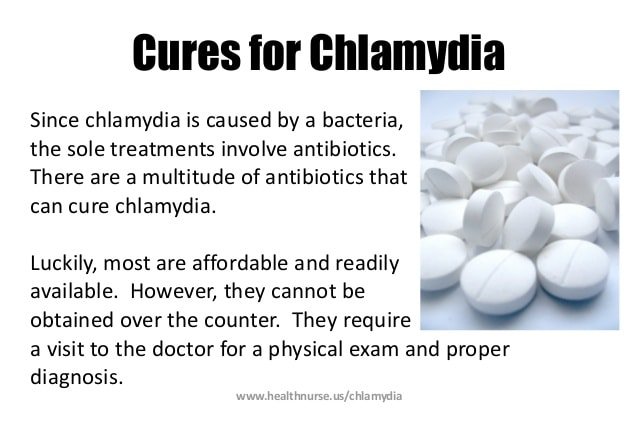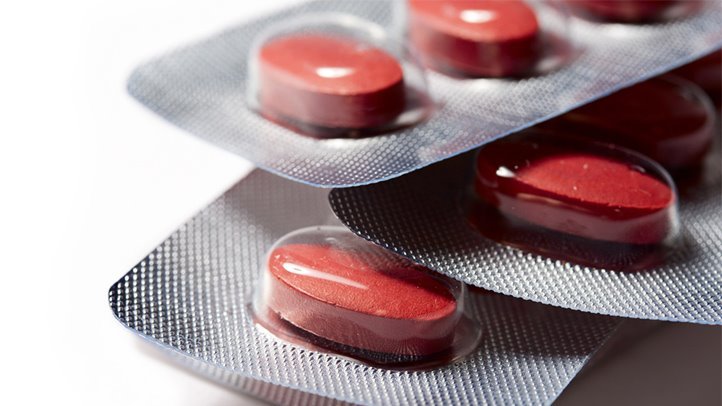Getting Treated For Chlamydia And Often Gonorrhea
If you have your own doctor, he will prescribe the antibiotics you need to treat chlamydia. If you dont have your own doctor, you can often find free or low-cost care at either a Planned Parenthood site or a community health clinic.
Listen carefully to the instructions for taking the medicine that you are given by the doctor or other healthcare provider, and follow them closely.
Ask questions if you dont understand something. Also, if you have other questions as you take your medicine, you can always call the pharmacist for help. They are often easier to reach than the doctor.
If you test positive for chlamydia, your healthcare provider is likely to also recommend that you be treated for gonorrhea. This is because the cost of treating gonorrhea is less than the cost of testing for the infection.
What Happens If Chlamydia Isn`t Treated
Not all people with Chlamydia will experience any complications. If the infection gets treatment early, it won`t probably cause any long-term damages. Still, with no treatment Chlamydia will spread to other body parts. The more times you get infected with it, the more like it is for you to experience complications.
- In men this condition may lead to an infection of the testicles and maybe even infertility.
- In women this infection may lead to inflammation and pain around the liver. With proper treatment, this usually gets better in time.
- In women this medical condition may spread to other important body organs leading to PID. In turn, this may lead to long-term damages, such as ectopic pregnancy, pelvic pain, infertility and blocked fallopian tubes.
- In both man and women More rarely, this infection may lead to joint inflammation. This is also known as SARA and it`s on occasion accompanied by eye and urethral inflammation. It occurs more rarely in women than men.
How Can I Prevent Chlamydia
To reduce the risk of getting infected with chlamydia, use a condom each time you have sex. Limit the number of sexual partners, or consider practicing abstinence.
If you think you are infected, avoid sexual contact and see a doctor. If you test positive, your partner should also get treatment. Get retested after three months, even if both you and your partner appear infection free.
Most doctors recommend that all people who have more than one sexual partner, especially women, be tested for chlamydia regularly even in the absence of symptoms. It is also recommended that all sexually active women under age 25 be tested yearly as well.
Read Also: Can You Buy Chlamydia Treatment Over The Counter
Chlamydia Symptoms & Treatment
FAST FACTS
- Chlamydia is a sexually transmitted infection that is normally passed on through sex without a condom or sharing sex toys with someone who has the infection.
- Using male or female condoms and dental dams during sex will help to protect you from getting chlamydia.
- Chlamydia is often symptomless however if left untreated it can lead to long-term health problems.
- Chlamydia is easily treated with antibiotics.
- Chlamydia can be passed on from mother to child during pregnancy, so its important for pregnant women to get tested.
What Is The Best Over

Over the counter medications cannot be used to treat chlamydia. Effective treatment for chlamydia relies on antibiotics, which are only available with a prescription.
Over-use of antibiotics in a population can lead to bacteria, including Chlamydia trachomatis, becoming resistant to the medication. In an attempt to limit the development of this problem, antibiotics are generally only available with a doctor’s prescription.
If they were available over the counter, they would likely be used much more frequently, including in cases where a person did not in fact have an infection that could be treated with an antibiotic — leading to the development of resistant strains. In fact, even with antibiotics only available of prescription, experts believe that doctors currently prescribe antibiotics far too readily, contributing to the problem of resistance. The only antibiotics available without prescription are topical .
Treatment for chlamydia is quite simple but you will need to see a healthcare professional to obtain it. The Centers for Disease Control and Prevention recommends a range of antibiotics — in most cases, either azithromycin or doxycycline .
You also need to see a healthcare professional to have your condition accurately diagnosed — the symptoms of several other sexually transmitted infections are quite similar to those of chlamydia.
Don’t Miss: Do I Have Chlamydia Male
How Can I Reduce My Risk Of Getting Chlamydia
The only way to avoid STDs is to not have vaginal, anal, or oral sex.
If you are sexually active, you can do the following things to lower your chances of getting chlamydia:
- Be in a long-term mutually monogamous relationship with a partner who has been tested and has negative STD test results
- Use latex condoms the right way every time you have sex.
Follow Up With Your Doctor As Directed:
Write down your questions so you remember to ask them during your visits.
The above information is an educational aid only. It is not intended as medical advice for individual conditions or treatments. Talk to your doctor, nurse or pharmacist before following any medical regimen to see if it is safe and effective for you.
Don’t Miss: Can Chlamydia Cause Prostate Cancer
The Costs Of Infertility
Treating chlamydia is easy, but for those who do not get treated or get treated too late, living with the damage caused by the infection can be hard.
Rabin has treated many women who never knew they had had chlamydia until they couldnt get pregnant due to blocked fallopian tubes. These women often wind up trying in vitro fertilization , which does not always succeed.
There are all kinds of costs involved for these women, say Rabin. There are emotional costs and physical costs. There are also financial costs with IVF. Its much better to not let the tubes get damaged, she says, and get pregnant the old-fashioned way.
How Is Chlamydia Spread
You can get chlamydia by having vaginal, anal, or oral sex with someone who has chlamydia.
If your sex partner is male you can still get chlamydia even if he does not ejaculate .
If youve had chlamydia and were treated in the past, you can still get infected again. This can happen if you have unprotected sex with someone who has chlamydia.
Read Also: What Are The Signs Of Having Chlamydia
What You Need To Know:
Chlamydia is a sexually transmitted infection caused by bacteria. Chlamydia is spread during oral, vaginal, or anal sex. The infection most often affects the urethra, rectum, or throat. The urethra is the tube that carries urine from your bladder to the outside of your body. Anyone with multiple sex partners is at higher risk for chlamydia. Your risk is also increased if you have another STI, such as gonorrhea.
Best Over The Counter Antibiotics To Treat Chlamydia
Want to treat Chlamydia without surgery? then, You should take some best rated over the counter antibiotics for same.
Often time when people became ill, they always go for a relief to seek for available medications at their local stores for prescriptions. Furthermore, their conditions are always minor and may not be life threatening. People use over-the-counter drugs, in treating beginning stages. Treating your STD in timely manner is very important, Whether you got chlamydia from toilet seat or you have chlamydia in your mouth.
Well, all these antibiotics have their various functions. They are just prescription, prescribe by your doctors and each and every one of them has what is does. They are all important, do not neglect anyone. All you have to do is to know the one that is needed for your problem. The most medical pharmacist can prescribe fully well than others.
Read Also: Does Chlamydia Hurt All The Time
What Medication Is Prescribed For Chlamydia
Chlamydia is a bacterial sexually transmitted infection . While most patients who have been treated for chlamydia are asymptomatic, it is imperative to be treated if you or a partner may have been exposed. The CDC recommended treatment for chlamydia is Azithromycin 1 g by mouth in a single dose or Doxycycline 100 mg by mouth twice a daily for 7 day. These options are equally as effective and chosen based on preference and patience tolerance to antibiotics.
How Long Does Azithromycin Take To Cure Chlamydia

It usually takes approximately 7 days for azithromycin to cure chlamydia. However, it can take up to 2 weeks for the infection to go away completely.
Avoid having sex during treatment or until the infection has cleared. Youll want to make sure its completely cured, or else youll risk passing it to someone else.
You May Like: Can You Get Hiv From Chlamydia
Chlamydia Treatment And Prevention
Milly DawsonSanjai Sinha, MDShutterstock
Chlamydia is easy to cure. If you test positive for chlamydia, basically you take an antibiotic, says Jill Rabin, MD, cochief in the division of ambulatory care for women’s health programs and prenatal care assistance program services for Northwell Health in New Hyde Park, New York.
Your partner must take an antibiotic, too, to keep them from reinfecting you, she says.
You have to have your partner treated, and if you have more than one partner, they should all be treated, says Dr. Rabin, regardless of your partners genders.
Even if you dont have chlamydia now, its wise to learn how to protect yourself so you wont develop this common infection in the first place. In women, chlamydia can create serious health problems, including infertility. Besides, no one ever wants to have a sexually transmitted disease and then have to tell other people about it.
How To Prevent Chlamydia
Below are some ways to prevent chlamydia
- Use condoms every time you have sex
- Discuss testing for sexually transmitted infections with your doctor or nurse
- Ask if you are due for your annual chlamydia screening
- See your doctor or nurse if you have any symptoms of chlamydia or another infection
- Do not have sex if you or your sexual partner has abnormal discharge, burning with urination, or a genital rash or sore
Recommended Reading: How To Get Chlamydia Pills
Can Chlamydia Come Back On Its Own
For people who were treated for this infection, it is perhaps not time to worry yet. Reemergence doesn`t happen that often, and when this infection return, it can still be treated. But if it does happen for a case to repeat itself, it may not be the right moment to blame the partner for cheating yet.
How Do You Know If Chlamydia Is Gone After Treatment
Your chlamydia symptoms should improve within a week of completing your course of antibiotics.
You do not need an immediate follow-up test to check if your chlamydia treatment has worked, as dead chlamydia bacteria may be detected 3 to 5 weeks after treatment, which would give a false positive result. But, if you have a rectal infection, you should have a test after treatment is completed.
If you are under 25 and have tested positive for chlamydia, it is recommended you take a repeat test 3 months after completing your treatment, to check you have not caught chlamydia again.
You May Like: What Pills Get Rid Of Chlamydia
Parents Have A Role In Chlamydia Prevention
Parents can do two main things to help their kids avoid getting chlamydia and other sexually transmitted infections , says Dombrowski. These two things are:
Testing And Treating Sexual Partners
If you test positive for chlamydia, it’s important that your current sexual partner and any other recent sexual partners you’ve had are also tested and treated.
A specialist sexual health adviser can help you contact your recent sexual partners, or the clinic can contact them for you if you prefer.
Either you or someone from the clinic can speak to them, or the clinic can send them a note to let them know they may have been exposed to a sexually transmitted infection .
The note will suggest that they go for a check-up. It will not have your name on it, so your confidentiality will be protected.
Page last reviewed: 01 September 2021 Next review due: 01 September 2024
Also Check: How Long Does It Take To Clear Up Chlamydia
Female Complications Of Untreated Chlamydia
Some women develop PID, an infection that can damage the uterus, cervix, and ovaries. PID is a painful disease that often requires hospital treatment.
Women can also become infertile if chlamydia is left untreated because the fallopian tubes may become scarred.
Pregnant women with the infection can pass the bacteria to their babies during birth, which can cause eye infections and pneumonia in newborns.
Possible Treatments For Chlamydia

It is good to stay aware about how to treat Chlamydia. In case of your test is found positive then you have to undergo Chlamydia treatment. Most of the doctors prescribe just a single dose of some antibiotics like azithromycin. But in case if you are allergic to its content then you may have to take other standard antibiotic.Note that if you are infected then let your previous sex partners know about the infection so that they can also undergo tests and treatments at right time. It is also possible to start Chlamydia treatment online because most of the experts are delivering fast and reliable services over internet for complete treatment of this Silent Infection.
Read Also: How Do Men Get Tested For Chlamydia
How Is Chlamydia Diagnosed
Chlamydia can be diagnosed with either a first-catch urine test or a swab collected from the endocervix or vagina in women, or a first-catch urine test or a swab collected from the urethra in men.
Self-collected vaginal swab testing is available and many women find this screening strategy highly acceptable.
- Geisler WM, Uniyal A, Lee JY, et al. Azithromycin versus Doxycycline for Urogenital Chlamydia trachomatis Infection. N Engl J Med. 2015 373:2512-2521. doi:10.1056/NEJMoa1502599
- Workowski, K, Bolan G. U.S. Department of Health and Human Services. Sexually Transmitted Diseases Treatment Guidelines, 2015. Morbidity and Mortality Weekly Report.
- WHO Guidelines for the Treatment of Chlamydia trachomatis. Geneva: World Health Organization 2016. 4, RECOMMENDATIONS FOR TREATMENT OF CHLAMYDIAL INFECTIONS. Available from:
- Chlamydia Treatment and Care. Centers for Disease Control and Prevention https://www.cdc.gov/std/chlamydia/treatment.htm
- Chlamydia Treatment Information Sheet. Wisconsin Department of Health Services.
Diagnosis And Treatment Of Chlamydia Trachomatis Infection
KARL E. MILLER, M.D., University of Tennessee College of Medicine, Chattanooga, Tennessee
Am Fam Physician. 2006 Apr 15 73:1411-1416.
Chlamydia trachomatis infection most commonly affects the urogenital tract. In men, the infection usually is symptomatic, with dysuria and a discharge from the penis. Untreated chlamydial infection in men can spread to the epididymis. Most women with chlamydial infection have minimal or no symptoms, but some develop pelvic inflammatory disease. Chlamydial infection in newborns can cause ophthalmia neonatorum. Chlamydial pneumonia can occur at one to three months of age, manifesting as a protracted onset of staccato cough, usually without wheezing or fever. Treatment options for uncomplicated urogenital infections include a single 1-g dose of azithromycin orally, or doxycycline at a dosage of 100 mg orally twice per day for seven days. The recommended treatment during pregnancy is erythromycin base or amoxicillin. The Centers for Disease Control and Prevention and the U.S. Preventive Services Task Force recommend screening for chlamydial infection in women at increased risk of infection and in all women younger than 25 years.
SORT: KEY RECOMMENDATIONS FOR PRACTICE
Azithromycin or doxycycline is recommended for the treatment of uncomplicated genitourinary chlamydial infection.
SORT: KEY RECOMMENDATIONS FOR PRACTICE
Azithromycin or doxycycline is recommended for the treatment of uncomplicated genitourinary chlamydial infection.
Recommended Reading: Why Do I Still Have Chlamydia Symptoms After Treatment
How To Use Azithromycin Oral
Take this medication by mouth, with or without food. You may take this medication with food if stomach upset occurs.
To prevent infection, take this drug as directed by your doctor, usually once a week on the same day each week. Continue to take this medication until your doctor tells you to stop.
To treat infection, take this drug as directed by your doctor, usually once daily at the same time each day. Continue to take this medication until your doctor tells you to stop. Stopping the medication too early on your own may allow bacteria to continue to grow, which may result in a return of the infection. Tell your doctor if your condition persists or worsens.
For the best effect, take this antibiotic at evenly spaced times. To help you remember, take this medication at the same time every day.
Antacids containing aluminum or magnesium may decrease the absorption of azithromycin if taken at the same time. If you take an antacid that contains aluminum or magnesium, wait at least 2 hours before or after taking azithromycin.
I Was Treated For Chlamydia When Can I Have Sex Again
You should not have sex again until you and your sex partner have completed treatment. If your doctor prescribes a single dose of medication, you should wait seven days after taking the medicine before having sex. If your doctor prescribes a medicine for you to take for seven days, you should wait until you have taken all of the doses before having sex.
You May Like: My Partner Tested Positive For Chlamydia But I Didn T